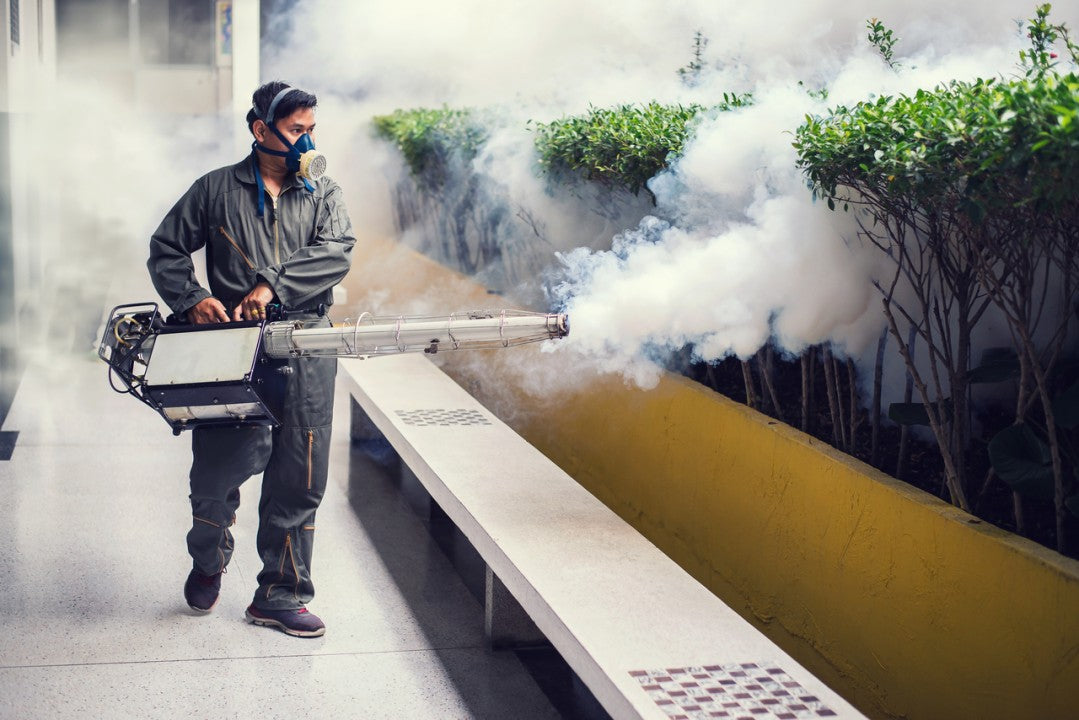Introduction:
In the ongoing battle to reclaim outdoor spaces from the clutches of mosquitoes, a variety of pest control methods have been adopted globally. Among these, fogging emerges as a widely accepted strategy for its quick action against mosquito populations. Yet, the repercussions of employing chemical-based fogging—both thermal and cold fogging techniques—span beyond their immediate effectiveness, impacting human health and the environment in profound ways.
Two Types of Fogging:
Thermal Fogging:
Thermal fogging involves using diesel as a solvent to produce dense smoke capable of reaching distances of 60-70 feet, penetrating hidden areas for comprehensive coverage. This method, suitable for expansive areas spanning 20-30 acres, is favored for large outdoor spaces. Nonetheless, the environmental toll of thermal fogging is considerable. The resultant smoke (as a result of burning diesel)contributes to air pollution, posing risks to human health and nearby wildlife.
Cold Fogging:
Conversely, cold fogging uses water as a solvent to disperse a fine mist, making it a more localized solution for spaces up to 1-2 acres. Although this appears to be an environmentally friendlier option, the chemicals dissolved in the mist still carry health and environmental hazards, albeit potentially less severe than those from thermal fogging.
Global Perspectives and Practices
Internationally, the conversation around pesticide use in mosquito control is evolving.
Organizations like the World Health Organization (WHO) have highlighted the need for safer, more sustainable approaches to pest management. The global increase in pesticide use underscores the urgency of adopting integrated pest management strategies, reducing reliance on chemical solutions while protecting human health and the environment.
Health and environmental concerns:
The use of chemical pesticides like malathion in outdoor pest control is widespread. Despite its effectiveness in eliminating flying insects, malathion has been linked to harmful effects on human health and the environment. The immediate death of insects upon contact and the lack of residual effect highlight the potency of these chemicals, raising concerns about their indiscriminate use, especially in residential areas where sprays are applied as frequently as thrice a week.
A concerning trend is the marketing of chemical products mixed with minimal amounts of natural ingredients, such as lemongrass oil, under the guise of being "herbal." This practice is misleading, as the addition of one or two herbal ingredients does not negate the potential harm caused by the primary chemical components. Such products offer a false sense of safety and sustainability, diverting attention from the need for genuinely eco-friendly alternatives.
The Road Ahead: A Call for Sustainable Practices
As we navigate the complexities of mosquito control, the pursuit of environmentally friendly and health-conscious methods becomes paramount. The conversation is shifting towards sustainable practices that minimize ecological footprints and prioritize public health. This evolving discourse underscores the importance of informed decision-making in the selection of mosquito control methods.
Conclusion:
The dependency on chemical fogging for mosquito management in outdoor areas presents a multifaceted challenge. Although effective in the short term, the health and environmental implications demand serious consideration. With growing awareness of these impacts, there's a rising call for safe, natural alternatives. Individuals and communities must weigh the immediate advantages of chemical fogging against its long-term consequences, advocating for practices that safeguard health and the environment alike.
My next post will delve into the world of herbal fogging solutions, shedding light on their advantages and effectiveness as a sustainable means of mosquito control.

